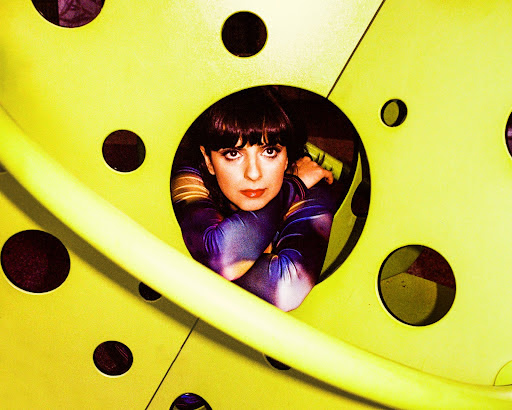Spacemoth – the project of Bay Area-based and Afghan-American artist, producer, engineer, and musician Maryam Qudus – recently announced her debut album No Past No Future out July 22nd via Sadie Dupuis’ label Wax Nine via Carpark Records. Qudus, who has made a name for herself collaborating with the likes of Toro y Moi, Tune-Yards, Sasami, Sad13, and more, has already shared two incredible tracks “Pipe and Pistol” and “This Shit” off of the forthcoming album, and now she shares another single. “Waves Come Crashing,” a whirlwind of noise that leads into darker, bass-heavy instrumentation as Qudus confronts the inevitability of death, and explores the most difficult part of falling in love: the fear of losing the person you love. The song is out alongside a kaleidoscopic video, which Qudus co-directed with Kimber-Lee Alston, and navigates love and loss through swirls of saturated prismatic patterns.
“‘Waves Come Crashing’ was written during a period when I was haunted by the idea of losing my partner,” Qudus explains of the track. “I would lay awake at night and all I could think of was what if something happens to them tomorrow? While I was unable to shake these thoughts, I slowly realized my time spent worrying about loss was consuming the time we have together.”
Qudus has made a name for herself as a sought-after producer and studio engineer, working with some of the most beloved artists in indie music at San Francisco’s Women’s Audio Mission and the iconic Tiny Telephone Recording. As a first-generation Afghan-American child of working-class immigrant parents, finding a place in music was nothing short of a challenge for Qudus. “Women are often discouraged from pursuing music in the Afghan & Muslim community, and those who follow that path receive a lot of heat,” she explains. Now, with her prominent work producing and engineering the sonic explorations of her peers under her belt, Qudus has masterfully constructed her own vision with the psychedelic space-pop of Spacemoth on her debut full-length, No Past No Future.
Rich in intergalactic, avant-pop, No Past No Future serves as a reckoning point between nostalgia and nihilism; it explores the struggle to hang on to a moment as it warps in time. The bulk of performance and production comes from Qudus herself, who favors vintage synths like the Yamaha CS-50 and Korg Polysix alongside fluttering tape manipulations; creating cosmic, lush soundbeds, drawing comparisons to beloved projects like Broadcast and Stereolab. Every track flows with Qudus’ low timbered vocals, in harmony with the watery, glowing synthesizers that anchor the album. The result is an album radiating in astonishment at the emotional landscape humans contain within ourselves, and in wonder at the preciousness of our time on earth.
Photo Courtesy: Pooneh Ghana











Social Media